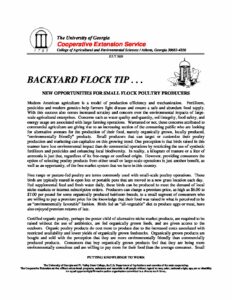Modern American agriculture is a model of production efficiency and mechanization. Fertilizers, pesticides and modern genetics help farmers fight disease and ensure a safe and abundant food supply. With this success also comes increased scrutiny and concern over the environmental impacts of largescale agricultural enterprises. Concerns such as water quality and quantity, soil integrity, food safety, and energy usage are associated with large farming operations. Warranted or not, these concerns a...ttributed to commercial agriculture are giving rise to an increasing section of the consuming public who are looking for alternative avenues for the production of their food, namely organically grown, locally produced, “environmentally friendly” products. Small producers that can target or customize their poultry production and marketing can capitalize on this growing trend. One perception is that birds raised in this manner have less environmental impact than do commercial operations by restricting the use of synthetic fertilizers and pesticides and enhancing local biodiversity. In reality, a kilogram of manure or a liter of ammonia is just that, regardless of its free-range or confined origin. However, providing consumers the option of selecting poultry products from either small or large-scale operations is just another benefit, as well as an opportunity, of the free market system that we have in this country.
ATTACHMENTS
Details
| Year | Volume | Number | Categories |
|---|---|---|---|
| 2009 | 49 | 12 |

